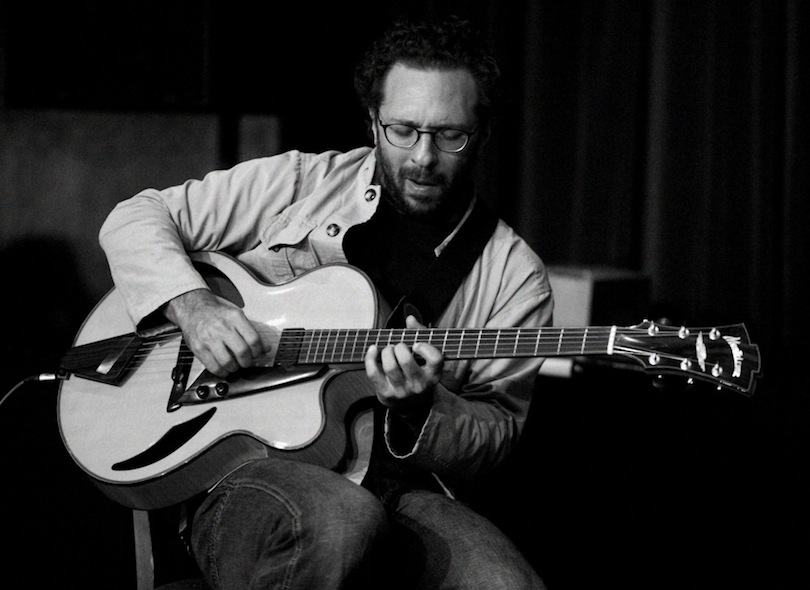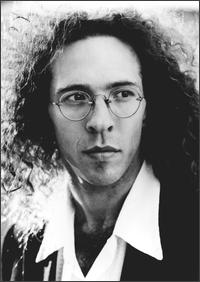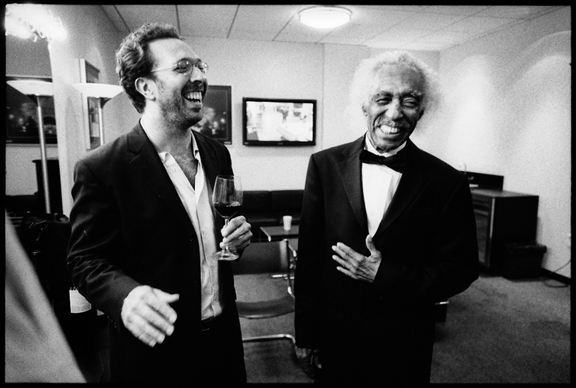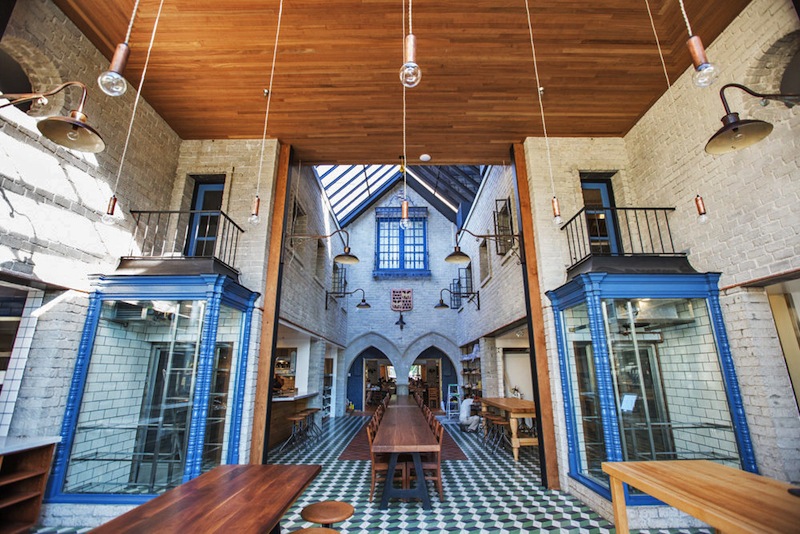This interview first appeared on the online publication In Search of Taste. Read it HERE.
Anthony Wilson is one of the leading musicians of his generation. Known for his imagination, maturity, and depth, the esteemed guitarist/composer/arranger has recorded ten solo albums since his Grammy-nominated debut album was released in 1997.

Wilson’s fourth album with his acclaimed nonet, 2006’s “Power of Nine,” was included in The New Yorker’s roundup of the year’s top ten jazz albums, and 2009’s “Jack of Hearts” included Larry Goldings and legendary drummer Jim Keltner in a set of music that approached the classic guitar-organ-drums format with a new spirit of play and possibility. A gifted accompanist as well as a formidable soloist, Anthony Wilson has been an indispensable member of Diana Krall’s quartet since he joined her in 2001 for a series of performances at Paris’ Olympia Theater that were collected on the Grammy-winning “Live In Paris,” widely considered a classic. Recordings and performances during the past decade with Paul McCartney, Leon Russell, Willie Nelson, Mose Allison, Bobby Hutcherson, Barbra Streisand, Madeleine Peyroux, and Aaron Neville have continued to spotlight Wilson’s growing artistry, musical flexibility, and improvisational authority.
Can you give us a potted biography? A bit about your musical influences/how you got into music?
I was born Los Angeles. My mother is a music freak, just one of the biggest fans of music, with one of the widest frames of musical reference, that I’ve ever known, and my father is a jazz musician—the composer/arranger Gerald Wilson.
I grew up & went to school in Los Angeles with all kinds of kids, some of them kids of musicians & music stars. A close friend’s dad managed Neil Young & Joni Mitchell. There was a certain kind of L.A. sound that was just in our ears all the time. Many of us loved music of all kinds and made little bands together from a very early age. Music was always such a big part of my life that I don’t think there was any conscious decision about whether I would do it… It was just there, part of the fabric and nature of my day-to-day life. When I took up the guitar at around 7 years old, it was just because it was the natural thing to do for a kid who couldn’t stop himself from singing songs all day.

Over the course of my life I guess I’ve absorbed so many things from all my many years of listening. I always loved Bob Dylan and Joni Mitchell, and they remain huge guiding lights for me today. Seeing The Band’s “The Last Waltz” on the big screen when I was about 10 years old truly— truly— changed my life. That film and the performances and songs on it had such an impact on me, and probably everything I want music to do can be traced back to the emotions and reactions I had seeing the diverse and powerful array of musicians who performed on that concert film. The Staple Singers singing “The Weight”? Oh man, there’s been nothing else like that, ever. I guess I’ve lived my whole life as a musician trying to get close to that feeling in music. And so many jazz composers & players have meant so much to me— none more so than Gil Evans, Duke Ellington & Billy Strayhorn, George Russell, and guitarists Wes Montgomery, Grant Green, Jim Hall and Bill Frisell.
And these days, I keep going back to Ry Cooder. His unbelievably visceral sound, the direct hit of emotion that comes through his music, and his sense of storytelling are all inspiring me in my own practice and performance. I also am in pure awe of the expressive powers of the voices of people like Harry Nilsson, Sam Cooke, and Twinkie Clark, of the gospel group The Clark Sisters.
How would you describe your music?
I probably wouldn’t try! People ask all the time and it’s really hard for me. Saying I’m a “jazz” musician opens the door, but sometimes to a room that’s too specific. And now that my music contains so many elements rooted in other types of music, it becomes a long process to even try to describe. I am most interested in telling stories and tapping into emotions with songs. The technical side of music is not interesting to me unless it’s something that can help me communicate something to the listener, and I really can’t stand lots of meandering solos in instrumental music. I’ve tried to edit all that kind of stuff out of my performances, and to find musicians who are interested in doing the same. Also, I’ve begun to sing again— I sang in bands until some time in my mid-20’s and then stopped and ended up doing, and being identified with, only instrumental music for a number of years— and I’m loving the way that singing a good melody and a good lyric in a direct, simple way, can help focus my playing.
A bit about your non wine tastes – how do you relax, what sort of food you like…
Exercise, at least a few days a week, both relaxes and motivates me. Mostly I go running, around 4 to 5 miles. But if I am anywhere near a pool, sea, or ocean where I can take good long swim, I’ll do that as well. And when traveling, if I have a day with enough at hours open to do it, I’ll just wander around a city on foot with no goal in mind. All over the world, I’ve found some of my favourite restaurants, bookstores, galleries, & record stores this way. Reading, looking at art & cinema, listening to music: these are all some of the ways I relax.
When I have time, I definitely love to cook or bake at home as well. I make pretty simple stuff: sausages on the grill with warm potato salad, spaghetti alla carbonara (or with fresh pesto), caponata, simple roast chicken. And I bake these really delicious chocolate chip cookies according to a recipe I found on pastry chef David Lebovitz’ website, or a kind of hippie granola full of different grains, seeds & nuts for my morning breakfast.
For restaurants, I like places that serve simple, homey food, regardless of the country/culture of origin. Some places I love around the US are Zuni Café and Una Pizza Napoletana in SF; Night+Market and Sqirl in LA; Pizzeria Bianco in Phoenix, Arizona and Cafe Pasqual’s in Santa Fe, New Mexico; Diner and Roberta’s in Brooklyn; Neptune Oyster Bar or The Butcher Shop in Boston.
Is there any (metaphorical) correlation between the style of the music that you play and the kinds of wines you enjoy drinking?

Now that you mention it, I think there must be. For me in my own music, the objective is to present sound, emotion, and energy that can communicate in a direct way to the person who’s listening. I try not to clutter up the sound with extra elements of craft placed there just for effect. I also dislike music that is too polished, or seems bent on achieving perfection but loses all sense of balance in that quest. With wine, I return to products that, to my taste at least, do something similar. If a wine seems overly “crafted” to me, or if it seems that a heavy hand was used in trying to give the wine layers of flavour or complexity, I’ll probably not finish the glass. Music, like wine, derives complexity not from its maker trying to manipulate the performance for effect, but from its maker actually getting out of the way and letting the music just “be.” I like fresh, energetic wines that feel connected to the fact that their source material is grapes. I like wines that somehow feel like “life” to me, not like a luxury product.
Why is wine important to you? (Assuming that it is!)
Wine has simply put me in touch with so many aspects of living that I appreciate. Places, people, sensory experience, taking time to enjoy it all.
Wine influences? Who or what brought you to appreciate it as a drink and as a subject?
Among the most important wine influences for me would be the American importer Kermit Lynch. It was in reading his book “Adventures on the Wine Route” back in 1994, and subscribing to his Berkeley, CA-based wine shop’s monthly wine newsletter— and in then correlating the things I was reading about with bottles that I could actually afford to try—that I began to get a sense of the diversity and excitement of the world of French wine. At that early point in my wine drinking history, so many of Kermit’s imports (especially those from the Beaujolais) embodied qualities that I still value today: drinkability, freshness, vibrancy. And they were not fancy wines or fancy brands, but rather wines made by grower/farmers, deeply connected to tradition and terroir. As a musician very much involved with keeping the connection to tradition alive, the kind of wines Kermit was importing, and the narrative he used to speak about them, communicated very strongly to me.
In the mid to late 1990’s, I remember also paying attention the wines that Martine’s Wines was importing, many of which were actually pretty affordable at that time. She had Rayas, which was a splurge, but by no means the kind of expense that it is today. Later on I also really paid attention to the imports of Louis/Dressner and Neal Rosenthal. As somebody living in the US, and I know I’m not alone in this, having that awareness of the work of different importers really helped me to put things together and develop a sense of what I liked the most in wine.
What do you think of the commercial wine scene?

It is, at least in the USA, better and healthier than it’s ever been. There is a huge pool of foreign producers represented by good importers who have decent distribution, and it’s gotten much easier, even in far-flung markets, to find something drinkable or really delicious. Our domestic producers, especially on the west coast, are now a much less monolithic lot, and they are generally making wines that make more sense to drink with food— fresher, more balanced wines.
But by and large, people in the US still are stuck in the paradigm of looking at wine as part of luxury, or elite, culture. We simply don’t grow up with wine being part of the everyday “at table” experience, where it becomes second nature, more integrated with the food we eat, our community, etc. So even if the influence of critics and the 100 point scale has been dismantled a bit here in the states, and there are thousands more wines available to experience, I notice that people still don’t want to be seen drinking “the wrong thing.” So many folks, even people who should know better, still hunt for and fetishize the newest, hottest producer. I often notice people—not only drinkers, but merchants and sommeliers— talking about and clinging to wine brands as though they were handbags, jeans, or cars.
What it comes down to for me is a sense of drinkability. If I go into your shop and you try to sell me a bottle of Chablis from a famous producer that at this moment might be too young, angular, or austere when you could sell me a bottle of Macon or Beaujolais Blanc that is simply drinking great tonight, I have to ask myself what your priorities are. I’m in this to really have fun drinking wine. The rest of it I don’t care about.
Do you think wine journalists have too much influence? Or do you think that their influence is more perceived than actual?
Well, the influence is next to nil for me. But they probably also have more perceived influence than actual. I mean, it’s a very small community of people that really pay attention to wine journalists. It’s the wine trade, and the people who are chasing what they think are the “best” wines, or wines that might be rare or allocated. They read the journalists so they don’t miss out. That all plays into the whole fetishisation and brandchasing that I mentioned before. But I think the vast majority of people pay more attention to advertising, and then word of mouth. I mean, if a good friend tells you,
“OMG, I just had the most amazing Chenin from Saumur yesterday,” aren’t you likely to give it a try? I probably would. Then a smaller sector of people are listening to sommeliers and merchants. If you’re at your favourite restaurant or shop, and the proprietor says, “With this dish, there’s nothing more perfect than this pet-nat of menu pineau,” a customer might take a chance there. But I have to say that I’ve often been led down the garden path by paying attention to the recommendations of writers— and that’s not only with wine— so for me, I take what I read from so-called experts with a grain of salt.
What, if anything, do you understand by the term natural wine?
Personally, I reference it back to the community of people such as Chauvet, Neauport, Lapierre, etc., who in the 1970s began to produce wine with a certain mindset and methodology. They called their way of growing grapes & making wine “vin nature,” and that is basically what I understand to be natural wine. From what I recall, and I hope I’m correct, these guys were generally making wine with gamay grapes grown organically on granite soils, vinifying with cold carbonic maceration on the native yeasts, and not adding sulfur, to make a kind of “vin de soif,” something they could drink lots of without getting headaches. These kinds of wines are my template for natural wines.
But that carbonic, no-sulfur method admittedly tends to result in a pretty specific vibe in the finished wine. It’s not like you’re getting a GPS-zeroed-in expression of terroir. And since the days when those guys started their thing, it’s most certainly equally true that natural wines come from other places, other grapes, other types of soils, and from non-carbonic vinification. But the idea of a basically nothing-added wine with low or no sulfur, coming from non-chemical farming… that’s how I think of natural wine. And — when it’s good — I truly like to drink that kind of wine more than other types of wine.
But also when it’s not (good), I don’t go trashing the whole idea of natural wine like I’ve heard some people do. I don’t think we should throw the baby out with the bathwater. It’s like the word “jazz”: nobody knows exactly what it is when they try to describe it, but they know it when they hear it. Well, some people may consider Kenny G a “jazz” musician, and I sure don’t, so obviously we have some trouble there… and “natural wine” has the same kind of trouble as a term, but in its limited way it’s useful. Anyway, these are the terms we have, and I think we dig ourselves in deeper if we try to redefine and come up with new words.
Describe a wine that you would enjoy drinking every day?
Whether red or white, it would most likely be a young wine, relatively light in body, with a sense of prettiness to it, a sense of lift and good acidity, not much texture or structure, and it would certainly make me smile, or possibly even laugh, within the first sip or two.
Describe a wine that would not pass your lips if you could help it?
Though there are generally certain types of wine & regions I steer clear of, I won’t rule out any country, region, or type of wine here, because I always leave room to be surprised. But if I can help it, I will generally go out of my way to avoid any wine that is too thick or jammy, too marked by new wood, or anything that seems like it was made in a laboratory or factory.
Which wine bars/restaurants do you like to hang out it and, in your opinion, have fantastic lists and brilliant service?
I love Le Baratin in Paris. That’s gotta be one of my favourite places anywhere. Exceptional wine and food.
In Los Angeles, Kris Yenbamroong’s Night+Market has the most amazing Thai cuisine, a small but excellent choice of wines, and a delightful staff who makes me feel at home when I’m there.

Also in Los Angeles, I really like the wine lists at République and The Tasting Kitchen.
In New York, I’ve recently enjoyed the new Racines NY in Tribeca, Reynard in Williamsburg, and even though there’s been some changes there, I still think that The Ten Bells on the Lower East Side is one of the best places anywhere to go and drink.
When I go to San Francisco I spend as much time as possible at Terroir, and I love to drink wine, eat oysters and roast chicken at Zuni Café, a truly fantastic restaurant.
In Portland, Oregon, I loved Olympic Provisions for its decadent food and really strong choice of wines.
In Philadelphia, A Kitchen & Bar is great. Really, really good, and deep, wine selection there!
We all like making lists – can you give me your top wines of last year – regardless of price, provenance, colour etc?
Domaine Pierre Gonon Chasselas 2012 (from barrel)
Thierry Allemand Cornas sans-soufre 2011 (from barrel)
L’Anglore Tavel rosé 2012
Domaine Jamet Côtes-du-Rhône 2004
Domaine Guiberteau Saumur Blanc “Brézé” 2010
Domaine Overnoy/Houillon Arbois Poulsard 2009
Domaine Belluard Mont Blanc 2006
Desert island wines? One fizz, one white, one red, one free choice…
Well, they’re desert island wines, so that means I’m gonna be stuck with them every day on the island, so I’m not picking only fancy wines.
Champagne Jacques Lassaigne Le Cotet
Domaine de la Pepière Muscadet Clos des Briords
Marcel Lapierre Morgon
De Bartoli Marsala Vecchio Samperi Ventennale
Wine and music matching – a parlour game. Would you match 5 (or more if you prefer) of your favourite wines to 5 songs/pieces/ musical compositions.

The Weight (The Band & The Staples Singers, from “The Last Waltz”) — Les Maisons Brulées “Le Herdeleau” (Gamay, Pinot Noir, Pineau d’Aunis)
Drive Like I’ve Never Been Hurt (Ry Cooder, “I, Flathead) — Les Capriades Piège-à-Filles rosé pet nat (Gamay et al)
E Um Cravo e Tem Espinho (Johnny Alf, “Nós”) — Laurent Saillard “Lucky You” (Sauvignon Blanc)
Sweet Surrender (Harry Nilsson, “Knilsson”) — Calabretta, Etna Rosato (Nerello Mascalese)
Thanks for the Beautiful Land on the Delta (Duke Ellington, “New Orleans Suite”) – Thierry Allemand Cornas (Syrah)

